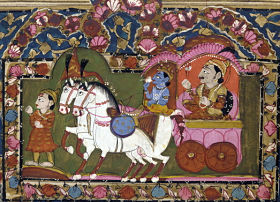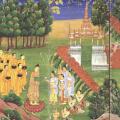14. World on a String: The Bhagavad-Gita
The Bhagavad-Gītā or “Song of the Lord” from the Mahābhārata ties its theory of detached action to an innovative conception of the divine.
Themes:
J.A.B. van Buitenen, The Bhagavadgītā in the Mahābhārata: Text and Translation (Chicago: 1981).
A. Hiltebeitel, The Ritual of Battle: Kṛṣṇa in the Mahābhārata (Albany: 1990).
A. Malinar, The Bhagavadgītā: Doctrines and Contexts (Cambridge: 2007).
R.N. Minor, Baghavad-Gītā: an Exegetical Commentary (Delhi: 1982).
P. Olivelle, “The Conception of God in the Bhagavadgītā,” International Philosophical Quarterly 4 (1964), 514-40.
C.A. Robinson, Interpretations of the Bhagavad-Gītā and Images of Hindu Tradition (London: 2005).
A. Sharma (ed.), New Essays in the Bhagavadgītā: Philosophical, Methodological and Cultural Approaches (New Delhi: 1987).

Origins


 ..
..



Comments
new episode plan?
Hi,
The episode-plan of indian philosophy announced at 30 aug. 2015, ie,
historyofphilosophy.net/indian-philosophy-preview
is almost completed. Do we have a new plan for the upcoming episodes, and if we have, is it possible to publish it? Such plans help me a lot because a do a bit of preliminary reading before listening to the episodes..
As usual, heartfelt thanks for these brilliant series of podcasts.
In reply to new episode plan? by mehmet
New episodes
Oh right, I should put that up. It is a bit tentative still but I can post what I have - will do that on the blog now.
relation to the gods
This podcast inspired me to read the Bhagavad Gita finally, and I'm very glad it did. But, I find the religious significance of the text, for those who take it religiously, sort of confusing. (I don't mean that as a criticism of anyone; I just don't understand.) It sounds like many of the people who value the B-G so highly, like Gandhi, value it for the wisdom in Arjuna's words, and what they take away from it is a commitment to non-violence. But to think Arjuna is right, you have to think Krishna is wrong, at least about some things. The translater's preface in the work I read suggests that Krishna eventually resorts to magic or some sort of overwhelming psychological force to "convince" Arjuna to fight, because he cannot convince him rationally, and notes that this seems illegitimate. But...how can it function as a religious text for anyone who reads it and takes the side of the human against the god? What attitude is the believer to take away from this?
Great work on these episodes on Indian philosophy; they've been excellent.
In reply to relation to the gods by Dawn
Gita
First of all let me say how glad I am that the podcast inspired you to go read the original text - that is always my biggest hope (and I'm glad you like the series more generally). It's an interesting point that many readers may find Arjuna to be the more attractive figure. I am not persuaded by the idea that Krishna can only convince Arjuna by magic; it seems clear to me that the authors of the Gita intend to show Arjuna gaining in understanding as Krishna takes him through a complex religious and philosophical theory, and if as a reader you find yourself thinking "Arjuna was right in the first place" then the Gita has not had its intended effect on you. To put it another way, we as readers are indeed supposed to identify with Arjuna, but that is really because we are ourselves supposed to be taught by Krishna, so that he is talking to us as much as to Arjuna. Of course this is complicated by the multi-layered and multi-authored genesis of the Gita, which means that the things Krishna is saying may not necessarily amount to a single teaching.
In reply to Gita by Peter Adamson
Hmm, that's helpful. I'll try
Hmm, that's helpful. I'll try to re-read it in that light. Thank you for answering!
In reply to relation to the gods by Dawn
THE MOKSHASHASTRA
Hi,I am an Advaita(non-dual) Student from India.I would like to answer your questions on many levels.Firstly,I am glad that you actually did read the Srimad Bhagvad Gita.It is better for everyone to first read it on their own.But I would like to point out some important factors and precursors to reading Gita.
The traditional Hindu commentators never ever stressed on the point whether Arjuna was right or Krishna was.Be it Adi Shankaracharya's Advaita doctrine, which I follow, or Sri Ramanujacharya's Vishistha Advaita Vedanta ,or Madhavacharya's dualist perspective, they have always kept the moral righteousness and intellectual proclivities of fighting the war or Arjuna being convinced aside.This is because the Bhagvad Gita is not just a Hindu text which tells us about the moral objectivity of a warrior who is deluded about fighting or of his charioteer giving him advice.It is a Mokshashastra,or the text which enables us to attain Moksha,and go beyond this world of suffering and excessive attachment, to understand the true nature of the self and have a different view to life.
All what Shri Krishna says is not convince Arjuna alone, but for all of mankind in general.They can apply it in their day-to-day lives in general.That is why it is essential to learn the Bhagavad Gita from a qualified Guru(A teacher which acts as a possibility to lead you from the unreal to the real).I suggest you learn from Swami Sarvapriyananda of the Vedanta Society,New York.His lectures are available on Soundcloud.Thanks and Pranama.
Thanks
Hi,
I am a PhD candidate in International Relations and a philosophy enthusiast.
I am currently reading the Gita, and I came across these lectures from a Facebook post by one of my previous lecturers. I just wanted to acknowledge the great work you have here for people who are eagre to learn and say thank you for brining so much knowledge to a public platform. I have spent the entire day on this website and am enthralled by the depth and variety of lectures that have been presented. Hope to learn much more from here.
With sincere thanks.
In reply to Thanks by Fatima Raza
Gita etc
Great! Glad you find it a helpful resource. Please thank your lecturer for spreading the word.
on thirukkural
The age old Tamil classic has a lot in common with Bhagavadgita. Thirukkural belongs to to the period before common era. Bhagavadgita belongs to 5th century CE, or later.
https://www.amazon.in/PHILOSOPHY-PENINSULAR-INDIA-THIRUKKURAL-ARAM-VISW…
In reply to on thirukkural by h.v.visweswaran
Thirukkural
Oh yes, actually Jonardon and I talked about devoting an episode to that text at one point... to be honest I am not sure why we didn't, I guess it would have been a good idea. Thanks for adding the reference, I hope other listeners will follow it up.
In reply to Thirukkural by Peter Adamson
Thirukkural in Bonus Episode, outside India series/book
I second the Thirukkural idea, but there's one problem: It doesn't fit into the post-classical Indian philosophy timeline, even if it's referenced by many later philosophers (including Gandhi). And it's not possible to insert it into the existing flow, since that will generate the need for a book revision too. So: How about a standalone Bonus Episode like the Animals series, that draws on many of the traditions covered so far but in a standalone fashion?
It looks like this is the only major classical Indian philosophical text that hasn't been covered, and if it does get a bonus episode it'll be fun to discuss how it fits into what's already on the India series. There are debates, for instance, on whether Thiruvalluvar (author of the Kural) drew on Jain thought or Upanishads, given the references to non-harm, non-violence, and veganism. And while the text is often regarded "secular ethical", it's interesting to see resemblances of stances from explicitly religious philosophies too. You could do a single episode, or two-part series of an explainer and an expert interview.
But the Thirukkural still seems anchored in its social context, whenever it was written: The text is divided into three parts, covering Virtue, Kingship, and Family Life. Notice that while virtue seems timeless, kingship was anchored in the political contexts of the day—just like Machiavelli's The Prince or Hobbes' Leviathan, to give two canonical Western examples. And of course there's the problem of pinpointing exact dates and authorship as with other ancient texts, Indian or otherwise. To reconsider the veganism case, it's interesting how the same view can be defended on multiple grounds: ancient thought to modern animal-rights ethicists.
In reply to Thirukkural in Bonus Episode, outside India series/book by Tarun G
Thirukkural
Thanks for the encouragement! So for the sake of argument, let's suppose I were going to do something like this: could you save me some time by pointing me towards a good translation and some secondary literature?
(One idea I have toyed with is to do, maybe for the 500th episode of the main series (?), an installment on things I wish I had covered, in retrospect. So I could fit this in there.)
In reply to Thirukkural by Peter Adamson
Thirukkural translations in English
There's many English translations, and Gopalkrishna Gandhi's is a recent one. There's another on this blog, though I'm not sure if the author is an academic/classicist. Project Madurai features GU Pope's translation, and that ubiquitous resource, Wikipedia, documents the history of English translations of the Kural.
These are the specific ones I've unearthed, and you can see the similarities between the non-Gandhi ones—Gandhi translation seems geared towards contemporary readers, and may be the best fit for the podcast. But the other two are open-access. I'll admit I have yet to read the Kural myself—always wanted to read it, given it's an important ethical text.
Add new comment